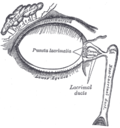Lacrimal sac: Difference between revisions
CSV import Tags: mobile edit mobile web edit |
CSV import |
||
| Line 29: | Line 29: | ||
{{Human systems and organs}} | {{Human systems and organs}} | ||
{{stub}} | {{stub}} | ||
<gallery> | |||
File:Gray192.png|Lacrimal sac | |||
File:Gray379.png|Lacrimal sac | |||
File:Gray896.png|Lacrimal sac | |||
File:Gray894.png|Lacrimal sac | |||
</gallery> | |||
Latest revision as of 04:30, 18 February 2025
Lacrimal Sac
The Lacrimal sac is a structure of the tear drainage system that is responsible for collecting tears from the eye's surface. It is located in the inner corner of the eye, between the eyelid and the nose. The lacrimal sac is part of the lacrimal apparatus, which also includes the lacrimal gland, lacrimal ducts, and nasolacrimal duct.
Anatomy[edit]
The lacrimal sac is a small, almond-shaped structure that sits in a groove in the lacrimal bone. It is connected to the lacrimal puncta, small openings at the inner corner of the eyelids, by the lacrimal canaliculi. Tears flow from the eye surface, through the puncta and canaliculi, and into the lacrimal sac. From there, they drain into the nasolacrimal duct and eventually into the nose.
Function[edit]
The primary function of the lacrimal sac is to collect and drain tears. This helps to keep the surface of the eye moist and clean, removing any dust or debris that may have entered the eye. The lacrimal sac also plays a role in the immune defense of the eye, as it contains lymphoid tissue that can produce antibodies.
Clinical significance[edit]
Problems with the lacrimal sac can lead to a number of conditions, including dacryocystitis, an infection of the lacrimal sac, and dacryostenosis, a blockage of the tear drainage system. These conditions can cause symptoms such as excessive tearing, redness, and pain in the inner corner of the eye. Treatment may involve antibiotics, surgery, or other interventions.
See also[edit]
| Anatomy of the globe of the human eye | ||||||||||||||||||
|---|---|---|---|---|---|---|---|---|---|---|---|---|---|---|---|---|---|---|
|
| Human systems and organs | ||||||||||||||
|---|---|---|---|---|---|---|---|---|---|---|---|---|---|---|
|






